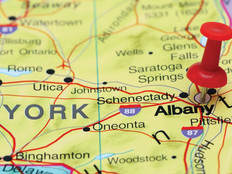Chattanooga's Broadband Investment Opens the Door to Telehealth
Several cities, including New York, Philadelphia, and Portland, Maine, have carved out reputations as innovators on deploying citywide Wi-Fi service. However, none of them can claim the kind of superlatives Chattanooga, Tenn., can: fastest internet in the United States.
Why is that? The Electric Power Board of Chattanooga, the city’s municipally owned telecom and utilities provider, has invested heavily in fiber-optic network infrastructure, delivering 1-gigabit-per-second connections. That has enabled residents to access superfast broadband services, but it could also spur the deployment of new services, including telehealth.
As Tech.co notes, according to a survey of 175,000 people conducted by Consumer Reports, the EPB received top marks for value, speed and reliability, and only Google Fiber comes close to matching EPB for value.
The city is actively exploring the idea of delivering telehealth services to residents who subscribe to EPB broadband services. With EPB closing in on 100,000 total subscribers, telehealth services could potentially benefit a significant number of residents.
“We’re right at about 98,000 customers today in our fiber optics division and getting close to having 100,000 by this fall,” EPB President David Wade told the EPB board in late July, according to the Times Free Press. “That’s a big milestone and one we are going to celebrate.” As the Times Free Press reports, when EPB launched its fiber-optic services in 2009, it projected it would get about 35,000 users.
Given that momentum, the city wants to use its broadband investments to offer a wider array of services. “We’re very interested and committed to participating in this telehealth market, and are evaluating our options,” Katie Espeseth, vice president of product development at EPB, tells Government Technology. “Having partners that provide innovative products and services is how we plan to maintain our competitive edge in this market.”
Chattanooga Tests Telehealth with Pilot Project
Docity, as Hypepotamus reports, is “a HIPAA-compliant telehealth platform that works by partnering with communities and internet service providers to add telehealth access to their normal packages.” If users get broadband service from an ISP, they can add telehealth services for as little as $30 per month, the report adds.
Docity CEO and co-founder James Cowan tells Hypepotamus that originally the company wanted to offer telehealth access as a monthly subscription, but found it could not just jump into the market that way. So, the company spent over a year marketing its products and services to provider groups and health systems.
“It helped because it educated us on the system and produced revenue, but we ultimately were able to pivot back to our intended goal once we got a contract for an in-home telehealth trial with Chattanooga EPB, the forward-thinking ISP in Chattanooga,” Cowan says.
In Good Health was a Chattanooga-based family medical practice that took part in a pilot test for Docity telehealth products and services conducted by EPB, according to Government Technology.
“Our patients who are under 40 were the most enthusiastic, especially if they have young children,” Dr. Laurie Davis, principal of the practice, tells Government Technology. “Parents quickly understand that hours spent in the waiting room full of other sick kids can be painful, and a video consult is just like being in the room with the doctor.”
Davis, whose office uses EPB-provided broadband adds: “Our practice built its reputation on the long-term relationships we have with our patients, and telehealth enables us to bring additional value to those relationships.”









